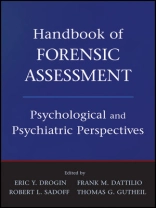The first handbook to explore forensic assessment from
psychiatric and psychological perspectives
‘The editors have assembled a magnificent collaboration between
psychiatrists and psychologists to bring forth critical knowledge
and insight to the core competency of forensic assessment. This
handbook is essential reading and a comprehensive resource for both
newly minted and seasoned forensic practitioners.’
–Robert I. Simon, MD, Director, Program in Psychiatry
and Law, Georgetown University School of Medicine
‘This long-awaited resource blows the dust off traditional
standards, shakes the cobwebs out of our old ways of thinking, and
shows the practical steps in producing work that will make sense to
juries and withstand the most skillful cross-examination. . . .
[T]here is no better resource.’
–Kenneth S. Pope, Ph D, ABPP, Diplomate in Clinical
Psychology; coauthor, Ethics in Psychotherapy and Counseling,
Fourth Edition
‘From preparation to collection to interpretation to
communication of the results, this excellent, comprehensive
treasure shows how to conduct forensic assessments. Each splendid
evidence-based chapter is presented from the collaboration between
psychologists and psychiatrists. It is a must-have resource for
forensic experts as well as general practitioners or anyone wishing
to understand standard of care in forensic assessment.’
–Melba Vasquez, Ph D, ABPP, 2011 American Psychological
Association President
The practitioner-oriented coverage in the Handbook of
Forensic Assessment examines:
* The current state of psychology and psychiatry–including
requisite clinical competencies, ethical guidelines, and
considerations of multidisciplinary collaboration
* Various approaches to assessments in criminal and civil
matters
* The principles of effective preparation, data collection, and
interpretation, as well as communication for each special
situation
* Topics including competence to stand trial, sexual offender
evaluations, addictions, child abuse, and education
* Overarching practice issues, such as practice development,
retention, compensation, consultation, and forensic treatment
* Includes sample reports that demonstrate the integrative
potential of both psychology and psychiatry
Incorporating a wealth of current and multidisciplinary
research, the Handbook of Forensic Assessment is destined to
become every mental health professional’s most valuable one-stop
reference for their forensic work.
Tabla de materias
Foreword vii
Preface xi
Contributors xiii
PART 1 CRIMINAL MATTERS 1
1 Competence to Stand Trial 3
Kathleen P. Stafford and Robert L. Sadoff
2 Competency to Waive Miranda Rights 25
Elliot L. Atkins and Kenneth J. Weiss
3 Sentencing 49
Elliot L. Atkins and Clarence Watson
4 Competency Restoration 79
Steven E. Samuel and Timothy J. Michals
5 Sex Offender Evaluations 97
Philip H. Witt, Frank M. Dattilio, and John M. W.
Bradford
6 Criminal Responsibility 121
Robert L. Sadoff and Frank M. Dattilio
7 Capital Litigation: Special Considerations 145
Alan M. Goldstein and Harold J. Bursztajn
8 Diminished Capacity in Federal Sentencing 171
Gerald Cooke and Henry R. Bleier
9 Testimonial Capacity 187
Randy K. Otto, Robert L. Sadoff, and Amanda M. Fanniff
10 Postconviction Proceedings 205
Aderonke Oguntoye and Eric Y. Drogin
11 Juvenile Delinquency and Decertification 227
Frank M. Dattilio and Laurentine Fromm
12 Addictions 255
Curtis L. Barrett and Richard F. Limoges
PART 2 CIVIL MATTERS 275
13 Personal Injury: The Independent Medical Examination in
Psychology and Psychiatry 277
Laurence Miller, Robert L. Sadoff, and Frank M. Dattilio
14 Employment Discrimination and Harassment 303
Liza H. Gold and William J. Stejskal
15 Structural and Clinical Assessment of Risk of Violence
335
Kenneth Tardiff and Dawn M. Hughes
16 Child Abuse and Neglect 361
Gillian Blair and Annie G. Steinberg
17 Abuse and Neglect of Adults 391
Carla Rodgers and Mark Siegert
18 Education and Habilitation 417
Mark J. Hauser, Robert F. Putnam, and Gregory I. Young
19 Child Custody and Parental Fitness 433
Gerald Cooke and Donna M. Norris
20 Americans With Disabilities Act Evaluations 459
Lisa Drago Piechowski and Urrooj Rehman
21 Civil Commitment 479
David F. Mrad and Clarence Watson
22 Competency to Consent to Treatment 503
Nicole Foubister and Mary Connell
23 Guardianship 521
Eric Y. Drogin and Thomas G. Gutheil
24 Psychiatric and Psychological Malpractice 543
Eric Y. Drogin and Donald J. Meyer
25 Fitness for Duty 571
Lisa Drago Piechowski and Albert M. Drukteinis
26 Psychological Autopsy 593
Frank M. Dattilio and Robert L. Sadoff
PART 3 FORENSIC PRACTICE CONSIDERATIONS 613
27 Developing and Operating a Forensic Practice 615
Stanley L. Brodsky and William H. Reid
28 Interstate Practice 649
Robert L. Sadoff and Frank M. Dattilio
29 Conceptualization and Assessment of Malingering 659
Richard Rogers and Robert P. Granacher, Jr.
30 Transcultural Considerations 679
Seema Garg, Frank M. Dattilio, and Pietro Miazzo
Appendix A Scientific Glossary 697
Appendix B Legal Glossary 727
Appendix C Compendium of Cited Psychological Tests 745
Appendix D Sample Reports 751
Psychiatric Evaluation–Juvenile Decertification 751
Psychological Evaluation–Juvenile Decertification 758
Preliminary Report on Psychology Board Complaint by Ms. B
Against A, Ph D 777
Author Index 789
Subject Index 797
Sobre el autor
ERIC Y. DROGIN, JD, PHD, ABPP, is a Diplomate and former
President of the American Board of Forensic Psychology and a Fellow
of the American Academy of Forensic Psychology. He serves on
the faculties of the Harvard Medical School and the Harvard
Longwood Psychiatry Residency Training Program, and teaches courses
in law and mental health for the University of New Hampshire School
of Law and the University of Wales. He is the author of
several books, chapters, and articles addressing the interface of
psychology, psychiatry, and law.
FRANK M. DATTILIO, PHD, ABPP, holds a dual faculty
position in psychiatry at Harvard Medical School and the University
of Pennsylvania School of Medicine. He has published widely
and has testified in numerous state and federal jurisdictions for
the prosecution and the defense, and has served in numerous court
appointments in criminal cases. He has consulted on cases for
the United States Department of Justice and the Federal Bureau of
Investigation and is a prolific author and international
speaker.
ROBERT L. SADOFF, MD, is Clinical Professor of Forensic
Psychiatry and serves as Director of the Forensic Psychiatry
Fellowship Program at the University of Pennsylvania School of
Medicine. He is board certified in psychiatry, forensic
psychiatry, and legal medicine. Dr. Sadoff has conducted over
10, 000 forensic psychiatric examinations, has lectured throughout
the United States and several countries abroad, and is a prolific
writer, having authored or coauthored several books including
Forensic Psychiatry: A Practical Guide for Lawyers and
Psychiatrists, Psychiatric Malpractice: Cases and Comments for
Clincians–winner of the 1993 Manfred S. Guttmacher
Award–and Ethical Issues in Forensic Psychiatry: Minimizing
Harm.
THOMAS G. GUTHEIL, MD, is a Professor of Psychiatry at
the Harvard Medical School and an internationally known lecturer,
writer, and consultant on medicolegal issues, risk management, and
malpractice prevention. He is a founder of the Beth Israel
Deaconess Medical Center Program in Psychiatry and Law, currently
serves as the President of the International Academy of Law and
Mental Health, and is the author or coauthor of several books in
the areas of law and medicine, including the Clinical Hand-book of
Psychiatry and the Law–winner of the 1983 Manfred S.
Guttmacher Award–now in its Fourth Edition.












